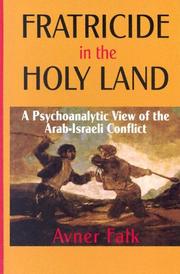| Listing 1 - 3 of 3 |
Sort by
|
Book
ISBN: 9004367780 9004367772 Year: 2018 Publisher: Leiden ; Boston : Brill-Rodopi,
Abstract | Keywords | Export | Availability | Bookmark
 Loading...
Loading...Choose an application
- Reference Manager
- EndNote
- RefWorks (Direct export to RefWorks)
Agnon’s Story is the first complete psychoanalytic biography of the Nobel-Prize-winning Hebrew writer S.Y. Agnon. It investigates the hidden links between his stories and his biography. Agnon was deeply ambivalent about the most important emotional “objects” of his life, in particular his “father-teacher,” his ailing, depressive and symbiotic mother, his emotionally-fragile wife, whom he named after her and his adopted “home-land” of Israel. Yet he maintained an incredible emotional resiliency and ability to “sublimate” his emotional pain into works of art. This biography seeks to investigate the emotional character of his literary canon, his ambivalence to his family and the underlying narcissistic grandiosity of his famous “modesty.”
Authors, Hebrew --- Agnon, Shmuel Yosef, --- Czaczkes, Samuel Joseph, --- Agnon, S. Y., --- Agnon, Shemuʼel Yosef, --- Shamūʼīl Yūsuf ʻAghnūn, --- ʻAghnūn, Shamūʼīl Yūsuf, --- Agnon, Shay, --- Agnon, Samuel Joseph, --- Ṭshaṭshḳis, Shemuʼel Yosef, --- ʻAgnon, Shai, --- Agnon, S. J., --- ʻAjnūn, Shamūʼīl Yūsuf, --- Agnón, Schmuel Iosef, --- Agnon, Shmuėl Iosef, --- Agnon, Šmuel Josef, --- Агнон, Шмуэл-Йосеф, --- עגנון, שמואל יוסף, --- עגנון, ש"י, --- Psychology. --- Ahnon, Shmuelʹ Ĭosef Halevi, --- Агнон, Шмуель Йосеф Галеві,

ISBN: 1282269577 9786612269578 0299202534 9780299202538 9780299202507 029920250X 9780299202545 0299202542 029920250X 0299202542 9781282269576 661226957X Year: 2004 Publisher: Madison, Wis. University of Wisconsin Press
Abstract | Keywords | Export | Availability | Bookmark
 Loading...
Loading...Choose an application
- Reference Manager
- EndNote
- RefWorks (Direct export to RefWorks)
Arab-Israeli conflict --- Psychoanalysis --- Psychological aspects. --- Social aspects --- Political aspects --- Israel --- Ethnic relations
Book
ISBN: 0429913923 9780429896952 042947492X 1282780107 9786612780103 1849408572 9781849408578 9780429899690 0429899696 9780429928154 0429928157 9781855757332 1855757338 Year: 2010 Publisher: London Karnac
Abstract | Keywords | Export | Availability | Bookmark
 Loading...
Loading...Choose an application
- Reference Manager
- EndNote
- RefWorks (Direct export to RefWorks)
This is the first and only book to examine the Crusades from the added viewpoint of psychoanalysis, studying the hidden emotions and fantasies that drove the Crusaders and the Muslims to undertake their terrible wars. The reader will learn that the deepest and most poweful motives for the Crusades were not only religious or territorial - or the quest for lands, wealth or titles - but also unconscious emotions and fantasies about one's country, one's religion, one's enemies, God and the Devil, and Us and Them. The book also focuses on the collective inability to mourn large-group losses and the collective needs of large groups such as nations and religions to develop a clear identity, to have boundaries, and to have enemies and allies. Motives which the Crusaders and the Muslims were not aware of were among the most powerful in driving several centuries of terrible and seemingly endless warfare. --Book Jacket.
| Listing 1 - 3 of 3 |
Sort by
|

 Search
Search Feedback
Feedback About UniCat
About UniCat  Help
Help News
News